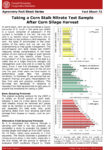The educational materials listed on this page are about Manure Management.
Manure management is critical on any type and scale of farm. Many farms that do not have livestock use off-farm manure for fertility purposes, while farms with livestock are challenged by storing manure and applying it to land in a sustainable manner. Sometime applied to fields as raw manure, there are many other types and uses of manure, such as horse manure compost, cow manure compost, goat manure fertilizer, organic manure and compost manure. Compost implies the manure is not raw but has been static or turned for a period of time, and therefore has broken down. Proper manure composting, including careful temperature management, will usually eliminate pathogens. If all harmful pathogens have been removed then composting horse manure to generate rich horse manure for garden spaces may be a great benefit for organic matter. Likewise, cow manure fertilizer could be good for soil fertility when used properly. There is not one single compost that is the best manure for your farm or garden, but if you learn the practices of how to compost horse manure, you are well on your way to finding out. Key practices include manure management, grazing management, nutrient management, composting, soil quality/health, riverbank protection, water management, nutrient cycling.
The Small Ruminants Topic Room is a useful starting place if you manage small ruminants, like goats and sheep, and want to find resources for manure management of these animals. If you want to understand the role of water in a farm system and how manure management may affect your water, check out Smart Water Use on your Farm or Ranch. SARE’s book Building Soils for Better Crops can provide useful information on how to reduce manure and nutrient runoff in order to improve soil fertility.
Showing 1-3 of 3 results

Nutrient Management in Corn Production
The following Cornell University agronomy fact sheets were developed during a 2009 SARE grant to help farmers and educators better evaluate nutrient cycling in corn production, thereby equipping them with information to make improved whole-farm management decisions: Illinois Soil Nitrogen Test for Corn, fact sheet 36 Fine-Tuning Nitrogen Use on Corn, fact sheet 63 Adaptive […]

Adapt-N Training Manual
Adapt-N is an online tool that helps precisely manage nitrogen (N) inputs for grain, silage, and sweet corn production. It can provide automatic daily updates of each field’s N status and recommendations, based on real-time weather influences, and can be used with any device with internet access.

Simple P Test Yields Millions in Savings
John Maxwell, a Geneseo, N.Y., dairy farmer, used to apply more than 60 pounds of phosphorus per acre when planting his 250 acres of corn. But after participating in a SARE-funded, statewide research project aimed at helping growers fine-tune their use of starter phosphorus fertilizers, he has reduced that to about 20 pounds per acre, […]